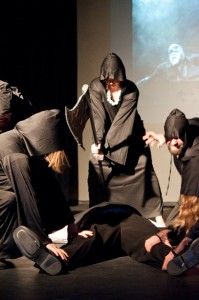Riffers critique media messages

March 23, 2013
As people entered the Marion Kleinau Theater Friday night, a stern movie usher gave them a long list of strict warnings.
David Whitfield, the play’s usher and graduate student in speech communication from Cairo, said he would rid the audience of a chance of laughing at sexual or religious jokes, no loud smacking, no balloons and no talking back to the screen during the premiere of “Nacht Der TextLichen Leiche: A Movie Riffer’s Performative Guide to Reanimating Bodies in the Dark.”
After Whitfield’s warning, the lights suddenly began to flicker and six “intruders” dressed like the Grim Reaper hopped on stage and harassed him. While Whitfield promised the audience would watch”Transformers 4,” a movie which doesn’t exist, the intruders instead presented the audience with an ‘80s movie titled “MegaForce.” Much like the show “Mystery Science Theater 3000” the group entertained the audience through the night by riffing through “MegaForce” and offering hilarious commentary.
Advertisement
The show is comical and encourages audiences to change the way they think about movies they watch by making fun of a film that is plagued with sexist material and false depictions of war. Whitfield said many people in today’s culture take in media messages but aren’t really thinking about those messages critically.
Whitfield said his character is designed to be a barrier between the play’s attendees and movie riffers by playing police to the audiences’ laughing responses to them. He tries to create a divide in the audience side with the loud, obnoxious riffers’ behavior and the quiet, uptight standards typical of any movie theater, he said. Whitfield said he also challenges the audience to examine whether the movie commentators’ jokes are done in good taste.
“I act as the moral compass of what is public or private (behavior),” he said.
Performance director Matt Foy, a graduate student in speech communication from Manly, Iowa, said the show criticizes “MegaForce” in an entertaining and enjoyable way. He said the movie shows many false war depictions Foy wanted to expose in a way that encouraged the audience to reflect on what war is in modern culture.
Foy said “MegaForce” depicted war to be all fun and games — nobody dies and the effects of war are watered down.
“For its sake, it was a kid’s movie,” he said.
However, this didn’t stop the movie’s riffers from poking fun at its war depictions. Riffer Greg Hummel, a graduate student in speech communication from Ashland, Penn., talked to the audience and at one point directly asked them what they’ve learned about war from the film. He resumed his film critique by noting the movie makes viewers accept the idea that war is a game.
Advertisement*
Beyond war, the riffers also targeted the movie’s sexist elements. Whenever the film had sexist dialogue, one riffer would make a sly remark that essentially rephrased what the character was really saying. For example, one scene featured two men engaged in conversation when a female character interrupts. Instead of paying her much mind, the two men continue their conversation and one riffer yelled for the woman to be quiet because the men were talking.
Andrea Baldwin, Kleniau marketing director and a graduate student in speech communication from Abilene, Texas, said the interaction between the riffers and the movie makes the show unique. Through the film’s humorous critique, the audience learns to critique themselves, she said.
Advertisement







